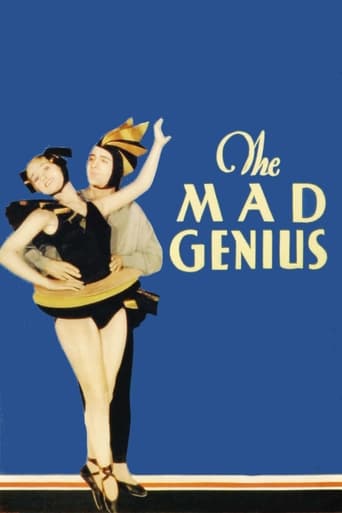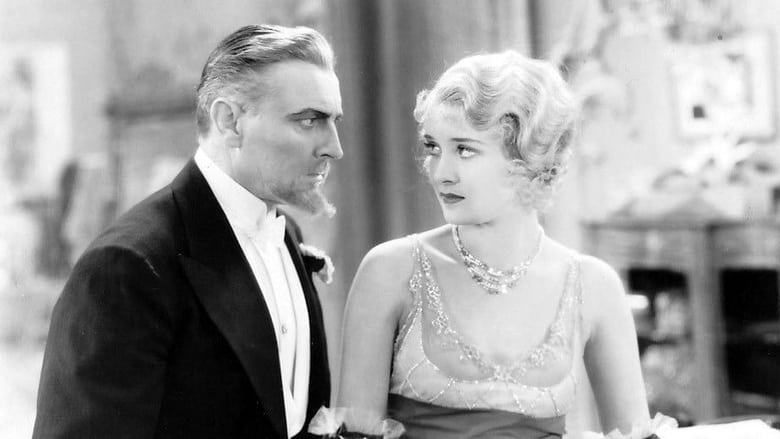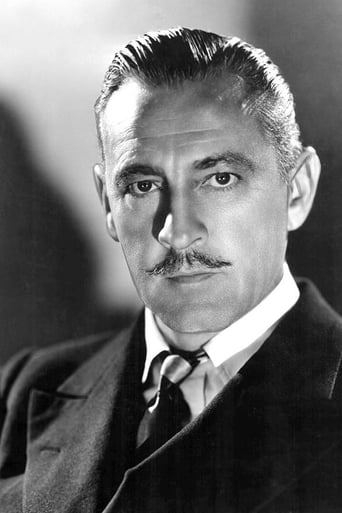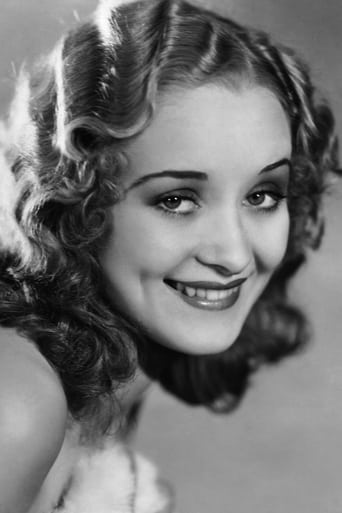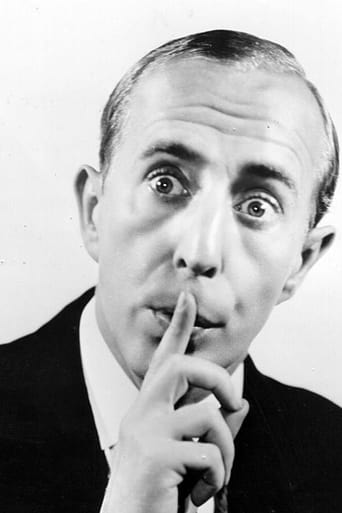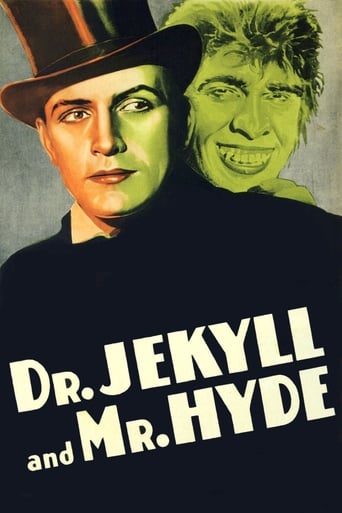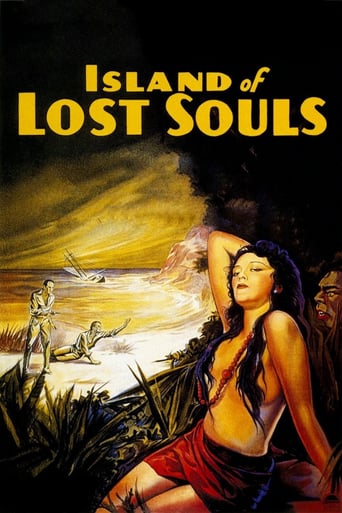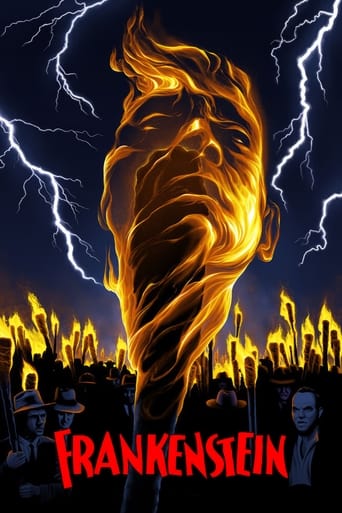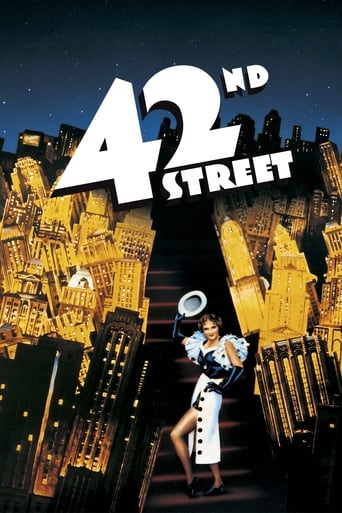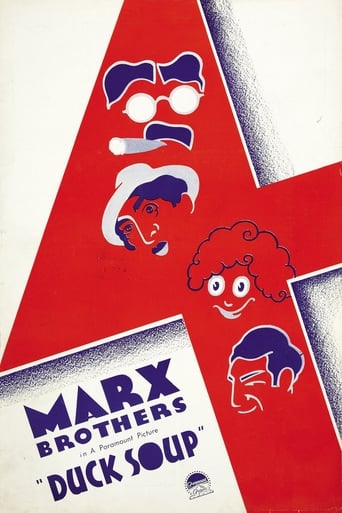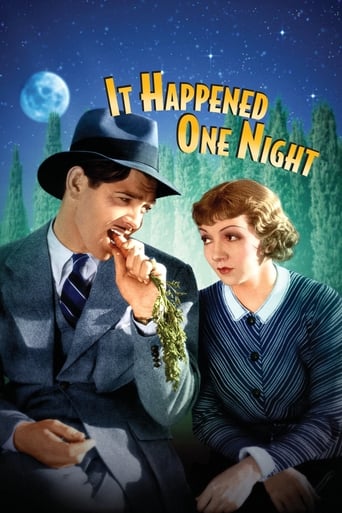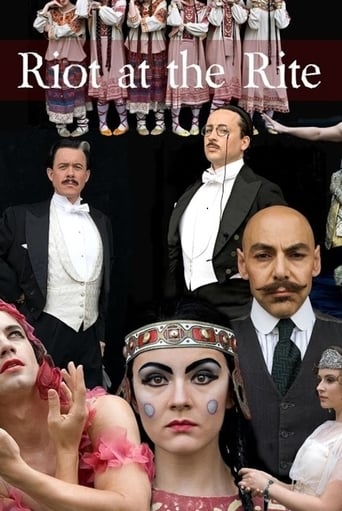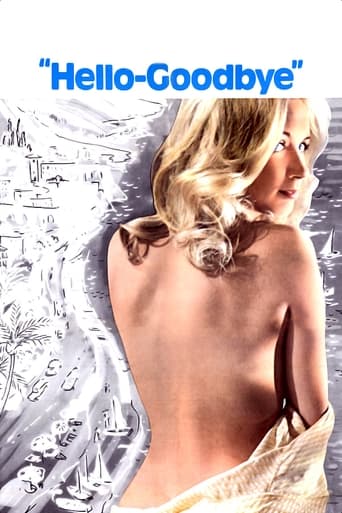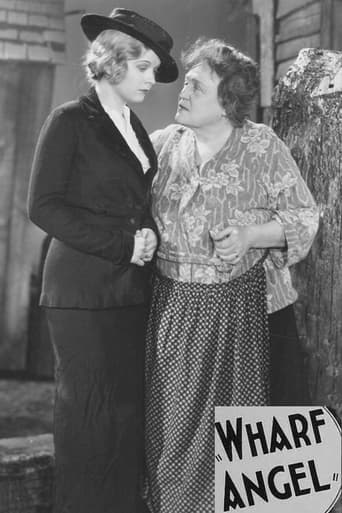The Mad Genius (1931)
A crippled puppeteer rescues an abused young boy and turns the boy into a great ballet dancer. Complications ensue when, as a young man, the dancer falls in love with a young woman the puppeteer is also in love with.
Watch Trailer
Free Trial Channels
Cast


Similar titles
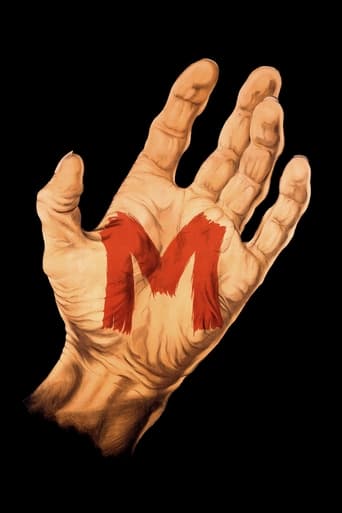
Reviews
That was an excellent one.
Strong and Moving!
Mostly, the movie is committed to the value of a good time.
Exactly the movie you think it is, but not the movie you want it to be.
In "The Mad Genius" John Barrymore delivers one of his most enjoyable screen performances, playing a club-footed, alcoholic, womanizing Russian puppeteer who takes an abused youth under his wing and molds him into a great star with the Ballet Russe, an accomplishment he could never attain himself due to his deformity. Some may consider his performance hammy, but at least it's Grade A.The film opens expressionistically somewhere in "Central Europe" on a rain-drenched night with Barrymore and his dim-witted sidekick (the deadpan Charles Butterworth) rehearsing a traveling puppet show when a barefoot youth (Frankie Darro), fleeing a beating from his insanely sadistic father (Boris Karloff), stumbles into their tent. Barrymore and Butterworth hide him and leave town in a horse-drawn wagon shot at a tilted angle as it creaks along a muddy road.Zip to Berlin several years later. The youth is now a young man (Donald Cook) who is in love with a fellow dancer (Marian Marsh). Barrymore, still the puppeteer but of humans now, wants no one interfering with his controlling relationship and maneuvers Marsh out of the company while elevating a lesser dancer to her position. Meanwhile, Barrymore's dance director (Luis Alberni) is slowly going mad from a cocaine addiction enabled by his employer. The two are locked together, feeding on each other's weaknesses, paralleling the central relationship between teacher-mentor and star-protégé. Barrymore needs Alberni's skills as a dance master; Alberni can't function without the drugs Barrymore provides.The camera often shoots from low angles, with ceilings visible. Lots of chiaroscuro. Pre-Code subject matter includes extramarital cohabitation, prostitution, drug addiction, and (for the time) grisly violence. Suggestive dialogue abounds.Barrymore feasts on the role. Luis Alberni plays the frenzied addict to the hilt. Marian Marsh and Donald Cook are sometimes mechanical and artificial but not to the extent that they undermine their roles and both have strong moments. Carmel Myers is excellent in a brief drunken scene with Barrymore.Donald Cook looks so much like the Warners contract actress Kay Francis that they should have been cast in a movie together as siblings. Just sayin'.
The Mad Genius is far from the best of John Barrymore's sound films. But it certainly provides a character for him to go full blast in terms of style and yet not seem overacted. Barrymore's plays a cripple who wanted to be a great ballet dancer, but only is confined to doing puppet shows with his sidekick Charles Butterworth.One day he and Butterworth rescue young Frankie Darro from a cruel father Boris Karloff. Barrymore sees in young Darro the promise and form of the dancer he wanted to be. This was before the Code so the homoerotic ideas in the scene are exploited to the max.Fast forward a dozen years and Darro is now Donald Cook at the top of his game as a ballet dancer, a veritable Nijinsky. He's also got eyes for pretty Marian Marsh, but so has Barrymore.Barrymore's years of training in the puppet theater have stood him in good stead as he's now a real puppet master, scheming and manipulating people to his will. His scene with Luis Alberni who is manager of the company to get him to do something he doesn't want to do is unforgettable. I won't reveal what he has over him, but this also was a subject later banned by the Code.Not the best of Barrymore's work, but it should provide a real introduction to his acting. And he's given great support by the ensemble Warner Brothers and director Michael Curtiz gave him.
John Barrymore had some wonderful performances over his film career. But, he also had some really terrible performances as well--ones which were far from subtle and terribly overacted. One of these embarrassingly bad performances was his famous "Svengali" and another was the follow-up film, "The Mad Genius". In fact, both performances seem just about identical--with Barrymore playing essentially the same sort of guy--a creepy manipulator who is troll- like and with a thick, thick accent. The plot of "Svengali" involves a creepy guy using his hypnotic-like powers to bend a woman to his will and make her a star. Here, it's a guy instead...but otherwise it's the same 'ol same 'ol.The bottom line is the film lacks subtlety and originality. While it might have played well back in the day, today it just seems very dated and dumb. Barrymore was capable of so much better than this and the film is extremely difficult to finish.
This movie was so obviously an attempt by Warners to cash in on John Barrymore's earlier "Svengali", they even reunited a lot of the cast - Barrymore, Marian Marsh, Carmel Myers and Luis Alberni. This movie was to ballet what "Svengali" was to opera, purportedly based on the relationship between Diaghilev and Nijinsky, although in reality Nijinsky had already created a stir in the ballet world before he met Diaghilev.John Barrymore gets a chance to play another "warped" genius and his performance dominates the film, without him it would be just a forgettable romance played out against a ballet background. This time he is a crippled puppeteer who, as a child, was rejected by his ballerina mother because of his clubfoot. Since then he has crushed his dreams and now runs a traveling marionette circus. When he gives shelter to a village boy, Fedor, (Frankie Darro) who is hiding from his cruel father (Boris Karloff), Tsarakov (Barrymore) vows "I will make him the greatest dancer of all time"!!! and within 15 years, Fedor (now played by Donald Cook) has taken the ballet world by storm. You definitely don't see Cook perform many intricate steps but he handles the dramatic part of the story okay. Tsarakov is now manager of a "Ballet Russe" (shades of Diaghilev) but behind his kindly uncle demeanor is an evil tyrant who manipulates people through their own weaknesses.Fedor is in love with the beautiful Nana (Marsh) but that does not fit in with Tsarakov's plans and he plots to have Nana expelled from the company. He forges a letter and forces drug addicted choreographer Bankieff (Luis Alberni) to sign - or he will withhold the drugs that he knows Bankieff craves. His plan backfires however and Fedor and Nana run away together, Fedor getting a job in a seedy cafe (a rare chance to hear Cole Porter's "You've Got That Thing") and sinking into a depression when he realises that ballet is in his blood. There is an interesting plot development when Fedor starts to exhibit the same characterizations as Tsarakov, in his voice and speech but apart from a couple of characters remarking on it, it doesn't go anywhere. It all ends in a completely melodramatic way that would have pleased Barrymore no end.In a 1985 Films in Review article, Marian Marsh recalled the happy memories she had of working with Barrymore. He was enjoying a period of great calm, he was happily married to Dolores Costello, he wasn't drinking (much) and his wife and little daughter "Dee Dee" often visited him on the set. Miss Marsh said that far from being "the Great Actor" he was very kind to her and helped her in her craft.

